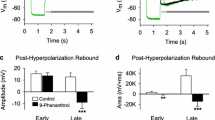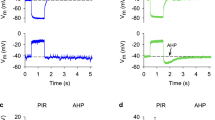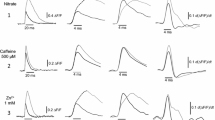Abstract.
We describe a new form of γ-aminobutyric acid (GABA) -mediated regulation of the inactivation and of the recovery from inactivation of the L-type Ca2+ current (I Ca ) in crayfish muscle. GABA (1 mM) was applied during a 2-min period and the peak I Ca was measured using two-electrode voltage-clamp recordings 30 min after returning to the control solution. Prepulse-pulse protocols showed that the GABA-mediated inhibition of I Ca decreased (>50%) both with increasing prepulse depolarization and as the delay between prepulse and pulse was reduced. GABA also shifted to depolarized values (>5 mV) the S-shaped plots of the peak I Ca evoked by a constant depolarizing pulse as a function of prepulse voltage (i.e., inactivation curves) and accelerated the recovery time from the inactivation evoked by depolarizing prepulses (>35%). The effects outlasted GABA application up to 1 h. The observed changes in inactivation properties may be of functional importance because they indicate that previous depolarization relieves the GABA-induced inhibition of I Ca , implying that this long-lasting inhibition is under the regulation of the prepulse potential and the subsequent Ca2+ entry.
Similar content being viewed by others
Author information
Authors and Affiliations
Additional information
Electronic Publication
Rights and permissions
About this article
Cite this article
Castellote, J., Buño, W. Sustained GABA-induced regulation of the inactivation of the voltage-dependent Ca2+ current in crustacean muscle fibers. Exp Brain Res 134, 90–95 (2000). https://doi.org/10.1007/s002210000445
Received:
Accepted:
Issue Date:
DOI: https://doi.org/10.1007/s002210000445




